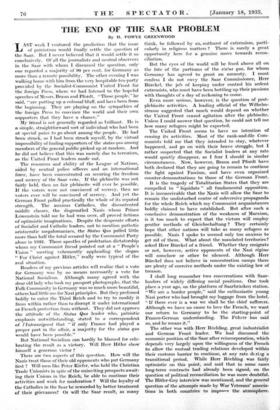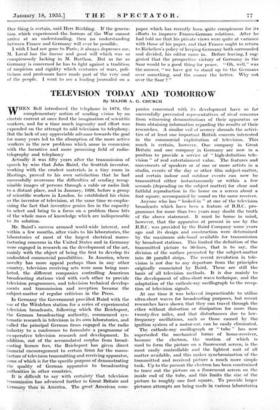THE END OF THE SAAR PROBLENI
By H. POWYS GREENWOOD UST week I ventured the prediction that the issue of patriotism would finally settle the question of the Saar. But I never believed that it would settle it so conclusively. Of all the journalists and neutral observers in the Saar with whom I discussed the question, only one regarded a majority of 90 per cent. for Germany as more than a remote possibility. The other evening I was walking home with him from the very hospitable tea-party provided by the Socialist-Communist United Front for the foreign Press, where we had listened to the hopeful speeches of Messrs. Braun and Pfordt. "Those people," he said, "are putting up a colossal bluff, and have been from the beginning. They are playing on the sympathies of the foreign Press to convince the world and their own supporters that they have a chance."
My friend is not generally regarded as brilliant. He is a simple, straightforward sort of individual who had been at special pains to go about among the people. He had been struck, as I had been struck myself, by the virtual impossibility of finding supporters of the status quo among members of the general public picked up at random. And he did not believe that this was merely due to terrorism, as the United Front leaders made out.
The resources and ability of the League of Nations, aided by neutral police officers and an international force, have been concentrated on securing the freedom and secrecy of the Saar vote.' If the plebiscite was not fairly held, then no fair plebiscite will ever be possible.
If the voters were not convinced of secrecy, then no voters ever will be convinced of secrecy. And yet the German Front Polled practically the whole of its reputed strength. The anxious Catholics, the discontented middle classes, the disgruntled Nazis , whom Prince Lowenstein told me he had won over, all proved fictions of optimistic imaginations. Despite the desperate efforts of Socialist and Catholic leaders, not to mention pathetic aristocratic megalomaniacs, the Status Quo polled little more than half the total secured by the Communist Party alone in 1932. Those apostles of proletarian dictatorship whom my Communist friend pointed out at a " People's Union " meeting vehemently' applauding the slogan " For Christ against Hitler," really were typical of the real situation.
Readers of my previous articles will realize that a vote for Germany was by no means necessarily a vote for National Socialism. Although many. agreed with the dear old lady who took my passport photographs, that the Folk Community in Germany was so much more beautiful, others had little use for Nazi principles. But they preferred boldly to enter the Third Reich and to try to modify it from within rather than to disrupt it under international or French protection from without. They did not approve the attitude of the Status Quo leader who, patriotic emphasis notwithstanding, stated to a correspondent of l'Intransigeant that " if only France had played a proper part in the affair, a majority for the status quo would have been possible." - But National Socialism can hardly be blamed for cele'- brating the result as a victory. Will Herr Hitler show` himself a generous victor ?
There are two aspects of this question; . How will the Nazis treat those of their old opponents who put Germany first ? Will men like Peter Kiefer, who held the Christian Trade Unionists in spite of the uninviting prospects await- ing their Unions in the Reich, be able to continue their activities and work for moderation ? Will the loyalty of the Catholics in the Saar be rewarded by better treatment of their grievances? Or will the Saar result, as many think, be followed by an. outburst of extremism, parti- cularly in religious matters ? There is surely a great opportunity here for a genuine move towards recon- ciliation.
But the eyes of the world will be fixed above all on the fate of the partisans of the status quo, for whom Germany has agreed to grant an amnesty. I must confess I do not envy the Saar Commissioner, Herr Burekel, the job of keeping under control his ardent extremists, who must have been bottling up their passions with thoughts of a day of reckoning to come.
Even more serious, however, is the question of post- plebiscite activities. A leading official of the Wilhelm- strasse suggested that much would depend on whether the United Front ceased agitation after the plebiscite. Unless I could answer that question, he could not tell me how many refugees might be expected.
The United Front seems to have no intention of ceasing its activities. Most of the rank-and-file Com- munists told me that they intended to stay, whatever happened, and go on with their brave struggle, but I rather suspected that the Socialist leaders at any rate would quietly disappear, as I fear I should in similar circumstances. Now, however, Braun and Pfordt have both declared that they are going to remain to continue the fight against Fascism, and have even organized counter-demonstrations to those of the German Front.
It is the tragedy of Totalitarian States that they are compelled to " liquidate " all fundamental opposition. It is inconceivable that the Nazis will allow the Saar to remain the undisturbed centre of subversive propaganda for the whole Reich which my Communist acquaintances boldly claimed to have established. But after such a conclusive demonstration of the weakness of Marxism, is it too much to expect that the victors will employ gentler methods of Gleichschaltung ? They certainly hope that other nations will take as many refugees as possible. Nazis I spoke to Seemed only too anxious to get rid of them. What about the mandated territories? asked Herr Biirckel of a friend. Whether they emigrate or not, however, active opponents of the Nazi regime will somehow or other be silenced. Although Herr Bth.ekel does not believe in concentration camps there are plenty of coercive methods under the existing law of treason.
I shall long remember two conversations with Saar- landers of widely differing social positions. One took place a year ago, on the platform of Saarbriicken station. " We are a border people," said the enthusiastic young Nazi porter who had brought my luggage from the hotel, "If there ever is a war we shall be the chief sufferers. Although we have no cause to love the French, we want our return to Germany to be the starting-point of Franco-German understanding. The Fiihrer has said so, and he means it."
The other was with Herr Rochling, great industrialist and German Front leader. We had discussed the economic position of the Saar after reincorporation, which depends very largely upon the willingness of the French to allow the mutual trading relations developed within their customs barrier to continue, at any rate di.. ring a transitional period. While Herr Rochling was fairly optimistic on this point, and said that in some cases long-term contracts had already been signed, on the question of political reconciliation he was more doubtful. The Hitler-Goy interview was mentioned, and the general question of the attempts made by War Veterans' associa- tions in both countries to improve the atmosphere. One thing. is certain, said Herr Rochling. If the genera, tion , which -experienced, the . horrors of the Was cannot arrive at an understanding, then no understanding between France and Germany will ever be possible.
I wish -I had not gone to Paris ; it always depresses me. M. Laval has the finesse and good will which was so conspicuously lacking in M. Barthou. But as far as Germany is concerned he has to fight against a tradition of suspicion and rigidity which centuries of wars, poli- ticians and professors have made part of the very soul of the people. I went to see a leading journalist on a paper which has- recently been quite conspicuous. for its efforts. to -improve., Franco-German relations. After he had.told me that his private-views were quite at variance with those of his paper, and that France ought to return to Richelieu's policy of keeping Germany both surrounded and divided, his editor came. in. Before leaving, I sug4 gested that the prospective victory of Germany in the Saar would be a-good thing for peace. "Oh, well," was the answer, " we have got to stand up to the Germans over something, and the sooner the better. Why not over the Saar ? "







































 Previous page
Previous page